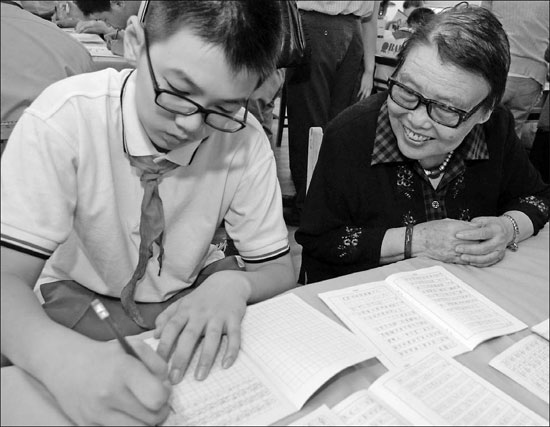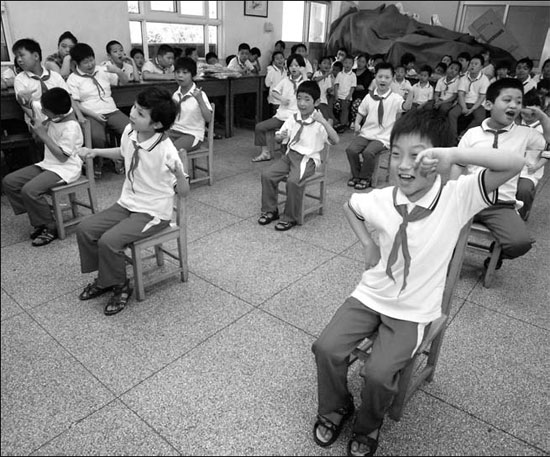A class of her own
Updated: 2013-01-08 07:56
By Cang Wei and Song Wenwei (China Daily)
|
||||||||
|
Han Rufen, 82, cares for students at Pengcheng Special Education School, which she founded in 1989, in Xuzhou, Jiangsu province. Photos by Fu Qian / For China Daily |
A woman's struggle to educate her intellectually disabled grandson inspires her to start a special education school. Cang Wei and Song Wenwei report.
Han Rufen has dedicated her retirement to changing hundreds of intellectually disabled children's lives.
Known as "Granny Han", the 82-year-old principal of the Pengcheng Special Education School in Xuzhou, Jiangsu province, cares for 132 students with Down syndrome, cerebral palsy and autism.
Her decision to help the children came in 1987, when her 7-year-old grandson, Hong Dian, was refused enrollment in all five public special education schools in Xuzhou because of his low IQ.
Han did all she could to negotiate with the schools. But no school would take her grandson, no matter how hard the family tried. Han's husband even sold his bicycle - the only thing of value the family owned - to raise money for expensive tuition.
Han, who couldn't bear to watch the boy's mother cry any longer, decided to teach the boy herself. She enrolled in special education teaching courses. Two years later, Han opened a school to help families facing similar situations.
At first, nobody knew Han, and no family wanted to send their children to her school. But she continued to visit families with intellectually disabled children to persuade them to give her school a try.
"You don't need to pay me," she told some parents. "Please, just send your children to the school to learn necessary survival skills."
Even then, some families still refused.
"Some Chinese parents believe their disabled children bring shame to the family," Han says. "So, they lock them up at home and never take them out."
She still vividly remembers the story of a little girl in the 1990s, whose parents refused to send her to the school. The girl was still unable to stand at 10 years old.
"The parents chained the girl to her bed to ensure her safety because they didn't have time and couldn't afford to hire a nanny to take care of her," she recalls.
Han explains that ignoring intellectually disabled children remains common in rural areas.
Han says she heard one utterance more than any other before her school opened: "You're crazy, old lady!"
In 1989, through her hard work and savings, Han established her school in a 15-square-meter room in the city's poorest neighborhood. There were five students.
Some neighbors expressed strong opposition.
"They asked us to leave and said they didn't want their children to be infected by the virus that (they believed) causes intellectual disabilities," Han says.
Neighbors forced the school to relocate 10 times from 1989-2004.
The school finally got its own building in 2004, thanks to many generous donors and government support.
American-Chinese Doreen Chin-Huang, a former UNESCO administrative officer in Beijing, was key to the construction of the 1,140-square-meter building.
She immediately rushed to Xuzhou after hearing about the school's needs.
Chin-Huang turned to the China Soong Ching Ling Foundation, an organization carrying forward the spirit of love for children and their healthy growth.
Han's school has since become a model for other special education schools.
Pengcheng School's enrollment is more than Xuzhou's other three private special education schools combined.
But the school still has to turn down applications because its capacity is limited, Han says. It can't accept children with serious physical disabilities because it doesn't have professional doctors or clinics.
Pengcheng provides 13 courses, including speech therapy, paper-cutting, painting, dancing, music and computers.
"We hope to educate the students to become active and self-sufficient individuals and workers in society," says Han's daughter, Hong Xiaoyun, who went to work at the school for free the day she retired six years ago.
Among the graduates, 59 have found jobs and 29 have been transferred to schools for children without learning disabilities.
Zhou Yifan, who has been studying in the school for eight years, plays the electric keyboard so well that her father later bought her a piano. Her grandmother cried when she heard the song Zhou played on Children's Day.
Hong Dian, 32, has been working as a cleaner at a local factory for nine years, earning a monthly salary of 750 yuan ($120). He's friendly and passionate.
He often starts conversations with strangers by asking: "Hey, what's your name?"
Then, Hong asks which characters are used to write the person's name.

"He's talented at remembering Chinese characters and song lyrics," his mother Qiang Wei says.
"He can easily remember cell phone numbers and recognizes almost all the Chinese characters in the dictionary."
But it might be harder for current students to do as well as Hong, given the financial strain the school faces.
Chin-Huang, the former UNESCO program officer, says raising money has always been a challenge.
One-third of the school's students come from families who live beneath the poverty line and don't need to pay tuition thanks to the Caterpillar and Hoglund foundations.
Other students must each pay 2,700 yuan a year, which is barely enough to cover their lunches and clothes.
Chin-Huang keeps the place afloat by constantly writing letters asking for financial assistance from friends, UNESCO, companies and foundations.
"Fundraising is really difficult," says Chin-Huang, who smiles when she explains that she calls herself "a professional beggar".
But, at least for now, Han's two children - Hong Xiaoyun, 61, and her 58-year-old brother - are taking care of the school.
"I'll work for the school for free as long as I can," Hong says.
Contact the writers through cangwei@chinadaily.com.cn.
|
Students attend lessons at Pengcheng Special Education School. |
(China Daily 01/08/2013 page20)

 In Photos: 7.0-magnitude quake hits Sichuan
In Photos: 7.0-magnitude quake hits Sichuan
 Li Na on Time cover, makes influential 100 list
Li Na on Time cover, makes influential 100 list
 FBI releases photos of 2 Boston bombings suspects
FBI releases photos of 2 Boston bombings suspects
 World's wackiest hairstyles
World's wackiest hairstyles
 Sandstorms strike Northwest China
Sandstorms strike Northwest China
 Never-seen photos of Madonna on display
Never-seen photos of Madonna on display
 H7N9 outbreak linked to waterfowl migration
H7N9 outbreak linked to waterfowl migration
 Dozens feared dead in Texas plant blast
Dozens feared dead in Texas plant blast
Most Viewed
Editor's Picks

|

|

|

|

|

|
Today's Top News
Live report: 7.0-magnitude quake hits Sichuan, heavy casualties feared
Boston suspect cornered on boat
Cross-talk artist helps to spread the word
'Green' awareness levels drop in Beijing
Palace Museum spruces up
First couple on Time's list of most influential
H7N9 flu transmission studied
Trading channels 'need to broaden'
US Weekly

|

|









